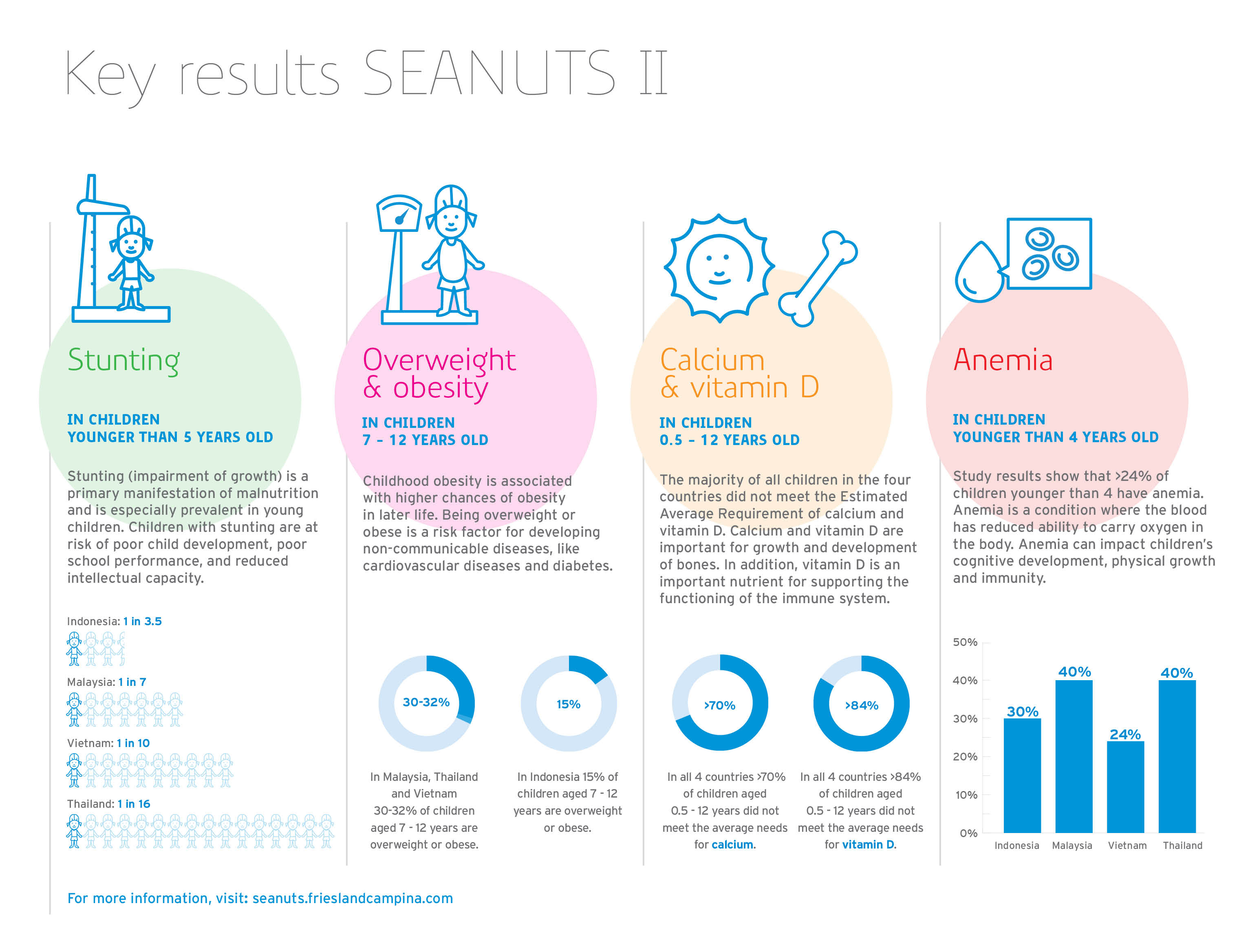A recently completed study of nearly 14,000 children, aged 0.5 to 12 years, highlights an important issue known as the ‘triple burden’ of malnutrition. This is the coexistence of undernutrition, micronutrient deficiencies and overweight/obesity. These three burdens often coexist in the same country and can even occur in the same family. The large-scale study, commissioned by FrieslandCampina, was conducted between 2019 and 2021 by leading universities and research institutes in Indonesia, Malaysia, Thailand and Vietnam.
This new study follows the South East Asian Nutrition Surveys (SEANUTS I), which was presented in 2012. Overall, this second study (SEANUTS II) shows that stunting and anaemia still exist, especially in younger children. However, for the older children, there is a higher prevalence of overweight and obesity. Also, most of the children do not meet the average needs of calcium and vitamin D intake and show vitamin D insufficiencies. This ‘triple burden’ makes it a matter of great importance to fill nutritional gaps with proper nutrition interventions and educational programmes.

Numbers show urgency of improving access to better nutrition
Commenting on the study’s findings, Professor Dr. Poh Bee Koon, Principal Investigator for SEANUTS II in Malaysia and Professor of Nutrition at Universiti Kebangsaan Malaysia’s Faculty of Health Sciences, Centre for Community Health Studies (ReaCH), explains: “Healthy nutrition is about balance, moderation and variety. If children don’t get the nutrition they need, they won’t grow and develop properly. Our new study revealed that more than 70 per cent of the children in all four countries did not meet the average needs for calcium and more than 84 per cent did not meet the average vitamin D requirements. These numbers emphasise an urgent need to improve food security, as well as the availability of food products that meet the children’s needs, thus increasing access to healthy nutrition.”

Professor Poh added, “The Malaysian Dietary Guidelines 2020 recommends that a balanced diet should consist of fruits, vegetables, carbohydrate and protein foods including two servings of dairy products per day”. However, one in four Malaysian children consumes a portion size of less than 100 ml of dairy, fewer than five times a week. Dairy is commonly consumed during breakfast, yet, one in three children in Malaysia do not get daily breakfast.
Professor Poh also said, “Research shows that stunted children with an unbalanced diet are more likely to suffer from anaemia and iron deficiency. Poor nutrition also has a negative impact on children’s cognition and potentially on their future lives.”
The undernutrition findings are highly alarming as the data is still behind the targets set by the Ministry of Health in the National Plan of Action for Nutrition of Malaysia III 2016- 2025.
Margrethe Jonkman, Global Director, Research & Development, FrieslandCampina, states: “Research is key to getting a better understanding of local nutritional needs. The results from this study will help FrieslandCampina in developing better and affordable products that meet the nutritional needs of children and in setting up programmes to promote a well-balanced diet and active lifestyle in collaboration with local authorities, health workers and schools”.
This content is provided by Neruda Communcations.
Interested in having your announcements on Malaysiakini? Contact the announcements team at [email protected] or whatsapp on +60 17-323 0707 for urgent matters.

